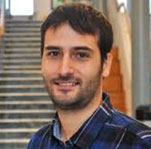Upcoming Webinar! Upcoming Webinar! “Direct Localization for Massive MIMO” presented by Nil Garcia and based on an IEEE Xplore article published in IEEE Transactions on Signal Processing

Upcoming Webinar! 2 October 2019
Webinar Topic: "Direct Localization for Massive MIMO"
Presented by Dr. Nil Garcia and based on an IEEE Xplore article
published in IEEE Transactions on Signal Processing
| Presenter: Dr. Nil Garcia
|
Date: 2 October 2019 Time: 11:00 am EDT (New York time) Duration: Approximately 1 hour Register: Attendee Registration |
About this Topic:
This webinar, “Direct Localization for Massive MIMO,” will discuss how Large-scale MIMO systems are well known for their advantages in communications, but they also have the potential for providing very accurate localization, thanks to their high angular resolution. A difficult problem arising indoors and outdoors is localizing users over multipath channels. Localization based on angle of arrival (AOA) generally involves a two-step procedure, where signals are first processed to obtain a user's AOA at different base stations, followed by triangulation to determine the user's position. In the presence of multipath, the performance of these methods is greatly degraded due to the inability to correctly detect and/or estimate the AOA of the line-of-sight (LOS) paths. To counter the limitations of this two-step procedure which is inherently suboptimal, [the researchers] propose a direct localization approach in which the position of a user is localized by jointly processing the observations obtained at distributed massive MIMO base stations. [Their] approach is based on a novel compressed sensing framework that exploits channel properties to distinguish LOS from non-LOS signal paths, and leads to improved performance results compared to previous existing methods.
About the Presenter:

Dr. Nil Garcia (S’14–M’16) received the Telecommunications Engineer degree from the Polytechnic University of Catalonia, Barcelona, Spain, in 2008; and the double Ph.D. degrees in electrical engineering from the New Jersey Institute of Technology, Newark, NJ, USA, and from the National Polytechnic Institute of Toulouse, Toulouse, France, in 2015.
He is currently a Postdoctoral Researcher of communication systems with the Department of Signals and Systems, Chalmers University of Technology, Gothenburg, Sweden. In 2009, he was an Engineer with the Centre National d’Etudes Spatiales. In 2008 and 2009, he had intern-ships in CNES and NASA. His research interests include the areas of localization, intelligent transportation systems, and 5G.

